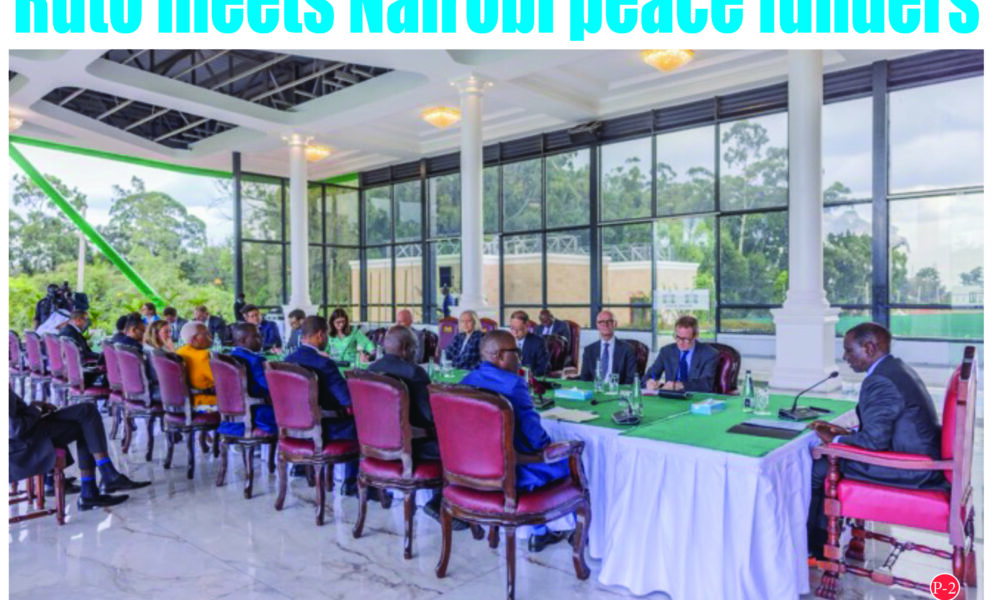By Dogga Luwo
Kenyan President William Ruto on Thursday met with representatives of donor nations to discuss the ongoing efforts to bring peace and stability to South Sudan.
The group was led by Lt. Gen. Lazarus Sumbeiywo (Rtd), the Chief Mediator for the Nairobi Talks known as Tumaini Initiative
“Friends of South Sudan,” included envoys from the United States, the United Kingdom, China, Saudi Arabia, Norway, Germany, Italy, the European Union, Qatar, and the United Arab Emirates.
President Ruto expressed his gratitude for the “invaluable contributions” of the donor nations towards restoring peace and stability in South Sudan.
He also expressed optimism about the Tumaini Initiative, which seeks to bring onboard non-signatories to the 2018 Revitalized Agreement on the resolution of Conflict in South Sudan.
“We acknowledge the invaluable contributions of Friends of South Sudan towards restoring peace and stability in the country. We are looking forward to the success of the “Tumaini Initiative,” which promises to empower South Sudanese to build a prosperous future for their country and region,” Ruto posted on his official social media pages.
The meeting comes hours after the government and members of the South Sudan Opposition Movement Alliance (SSOMA) signed a declaration of commitment.
Speaking during the signing of the agreement, leader of Real SPLM Group, Pagan Amum, said the declaration of commitment was dedicated to the fallen heroes and heroines and the entire people of South Sudan who are in anguish.
“We are here to declare our commitment to initiate an inclusive peace process that addresses the root causes of the conflict and fosters a truly inclusive environment where all voices of our people are heard and respected,” he said.
Amum emphasized that the Nairobi peace process will involve an ‘inclusive’ dialogue, inviting all non-signatory holdout groups from the 2018 peace deal.
He stated that leaders and stakeholders have agreed to focus on solving the country’s problems, treating the problem itself as the enemy, and ceasing to see each other as enemies.
“We will be working united and in collaboration with the government delegation here to rescue our people and to work for bringing a better future for South Sudan,” he noted.
“A South Sudan that is free, just and prosperous for all its citizens without discrimination, that is our commitment,” Amum continued.
Head of government high-level delegation, Amb. Albino Mathem expressed optimism that the success of the Nairobi Peace talks would bring lasting peace to South Sudan.
“We do believe if we succeed from here, we are going to work hand in hand to bring the comprehensive peace which will bring the lasting peace for the people of South Sudan,” he noted.
Meanwhile, the chief mediator for the talks, Gen. Lazarus Sumbeiywo, stated that the responsibility for finding a permanent solution to South Sudan lies with the delegates.
He emphasized the need for negotiations to be conducted consistently in good faith, calling the signing of the declaration of commitment as just one step in that direction.
“I want to assure the parties that the word ‘if’ will not be an operational word, it is ‘when’ and we want to know ‘when’ but not the word ‘if’ because it is not believed it’s ongoing to happen – it is going to happen,” he said.
Minister of Information, Micheal Makuei, who is also Rapporteur said the next STEP would be identifying the agenda for outstanding matters and negotiation commence.
“We need to come up with the agenda, we need to identify the issues which we need to discuss and after that, we sit down and negotiate so that we can come up with amicable solutions for those outstanding issues,” Makuei noted.
The talks were shifted from Rome, Italy to Nairobi under the mediation of the Kenyan government.
Although the holdout groups led by Paul Malong Awan and Pagan Amum accepted President Ruto’s mediation, the NAS under Thomas Cirilo and The National Democratic Movement-Patriotic Front allied to Emmanuel Ajwain rejected the Nairobi initiative, citing security concerns.




